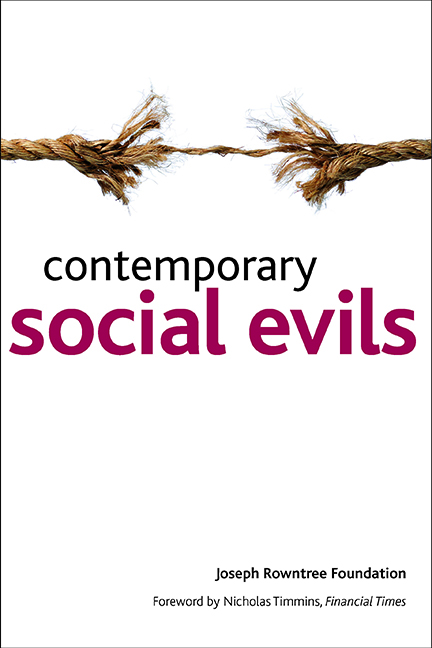Book contents
- Frontmatter
- Contents
- Foreword
- Acknowledgements
- Notes on contributors
- 1 Introduction
- 2 ‘Social evils’ and ‘social problems’ in Britain since 1904
- Section 1 Public Voices
- Section 2 Viewpoints
- A decline of values
- Distrust
- The absence of society
- Individualism
- Inequality
- Section 3 Reflections
- Appendix: How the ‘social evils’ consultations were organised
- Index
12 - The absence of society
Published online by Cambridge University Press: 26 January 2022
- Frontmatter
- Contents
- Foreword
- Acknowledgements
- Notes on contributors
- 1 Introduction
- 2 ‘Social evils’ and ‘social problems’ in Britain since 1904
- Section 1 Public Voices
- Section 2 Viewpoints
- A decline of values
- Distrust
- The absence of society
- Individualism
- Inequality
- Section 3 Reflections
- Appendix: How the ‘social evils’ consultations were organised
- Index
Summary
What price the social state?
The most remarkable and insidious feature of the present-day edition of social ills is that they arise mostly from the absence of society, rather than from its pressures. They are products of a gradual, yet relentless, withdrawal of ‘society’ as an entity that defines individual obligations while guaranteeing individual rights. ‘Society’ in that sense is now conspicuous mostly by its absence. Margaret Thatcher famously declared: ‘There is no such thing as “society”. There are only individuals and families.’ Peter Drucker (1989), the influential voice of emergent neo-conservatism in America, likewise announced that there was ‘no longer salvation from society’.
More than anything else, the ‘welfare state’ (which I prefer to call the ‘social state’) is an arrangement of human togetherness that resists the present-day ‘privatising’ tendency to break down the networks of human bonds and to undermine the social foundations of human solidarity. Where ‘privatisation’ shifts the task of resolving socially produced problems onto the shoulders of individual men and women (in most cases much too weak for the purpose), so the ‘social state’ has tended to unite its members in the struggle to protect them from the morally devastating competitive ‘war of all against all’ and ‘one-upmanship’.
A state is ‘social’ when it promotes the principle of communally endorsed, collective insurance against individual misfortune and its consequences. It is this principle that lifts the abstract ‘society’ to the level of a tangible, ‘felt-and-lived’ community. It replaces the mistrust-and-suspicion-generating ‘order of egoism’ with the confidence and solidarity-inspiring ‘order of equality’. And it is this same principle that lifts members of society to the status of citizens. It makes them stakeholders, in addition to being stockholders. They are beneficiaries, but also the actors responsible for the creation and decent allocation of benefits – citizens defined and moved by their acute interest in the common property and responsibility. The application of this principle may protect men and women from the bane of poverty. But, most importantly, it may also become a prolific source of social solidarity that recycles ‘society’ into a common, communal good. Society is raised to the level of community as long as it protects its members against the twin horrors of misery and indignity; that is, against the terrors of being excluded, of falling from the fast-accelerating vehicle of progress.
- Type
- Chapter
- Information
- Contemporary Social Evils , pp. 147 - 158Publisher: Bristol University PressPrint publication year: 2009



